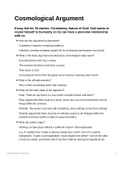Summary
Summary A level Religious Studies Edexcel: Cosmological argument
- Course
- Institution
These notes helped me to achieve an A* and provide a summary on the following: - basics of the argument - early ideas of the argument - structure of the argument - other forms of the argument - strengths and weaknesses
[Show more]



